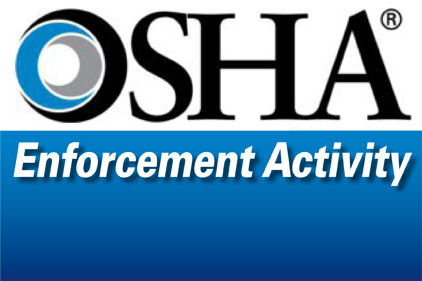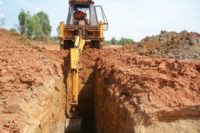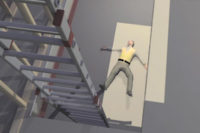 Despite being cited by OSHA following a 2013 trench collapse, a follow-up inspection found that C & G Refrigeration Inc. of Hanover, Pennsylvania, was exposing its employees topotentially deadly trenching hazards while they performed underground utility work at a residence. Investigators observed an employee working at the bottom of an unprotected trench that was 13-feet deep. They also observed a trench that was not widened with approved methods, such as benching or sloping, and determined that the employer did not provide any physical protection, such as trench shields or boxes.
Despite being cited by OSHA following a 2013 trench collapse, a follow-up inspection found that C & G Refrigeration Inc. of Hanover, Pennsylvania, was exposing its employees topotentially deadly trenching hazards while they performed underground utility work at a residence. Investigators observed an employee working at the bottom of an unprotected trench that was 13-feet deep. They also observed a trench that was not widened with approved methods, such as benching or sloping, and determined that the employer did not provide any physical protection, such as trench shields or boxes.
Violations included:
- Allowing employees to work in a trench without protection from a cave-in or an adequate protective system.
- Failure to protect employees from hazards by ensuring unsafe excavation materials were kept at least 2 feet back from the excavation's edge.
- Failure to instruct employees in the recognition and avoidance of unsafe conditions while performing trenching and excavation work.
- Failure to have a competent person conduct an investigation of the excavation.
- Additionally, the employer did not ensure workers used a protective helmet while in a trench.
The company, plumbing, heating and air conditioning contractor, has been placed in OSHA's Severe Violator Enforcement Program
These violations carry a $64,000+ penalty.
Two workers are killed every month in trench collapses.
In April 2013, OSHA cited C & G with four safety violations after a trench collapse at a work site in Hanover. Though there were no injuries in the collapse, investigators found employees working in an unprotected trench that was 7-feet deep.
"An unprotected trench can quickly become a grave without the proper safeguards in place. This is why it is critical for employers in this industry to ensure that trenching safeguards are in place," said Kevin Kilp, director of OSHA's Harrisburg Area Office. "This employer's history shows that it is fully aware of the dangers of trenching and excavation, yet they continue to put their worker's lives at risk."



